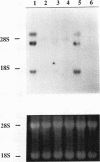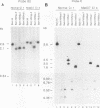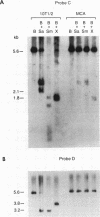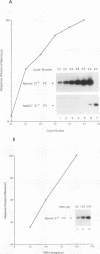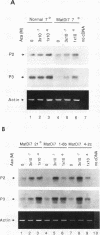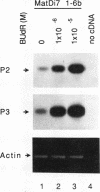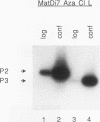Abstract
The mouse insulin-like growth factor II gene (Igf 2), located on distal chromosome 7, is parentally imprinted such that the paternal allele is expressed while the maternal allele is transcriptionally silent. We derived a cell line from a mouse embryo maternally disomic and paternally deficient for distal chromosome 7 (MatDi7) to determine the stability of gene repression in culture. MatDi7 cells maintained Igf2 in a repressed state even after immortalization, except for one randomly picked clone which spontaneously expressed the gene. Igf 2 was expressed in a cell culture derived from a normal littermate; this expression was growth regulated, with Igf 2 mRNA levels increasing in the stationary phase of growth. Analysis of the methylation status of 28 sites distributed over 10 kb of the gene did not show consistent differences associated with expression level in the normal and MatDi7 cell lines, and the CpG island in the Igf 2 promoter remained unmethylated in all of the cell lines. Only with an oncogenically transformed cell line did the promoter become extensively methylated. We attempted to derepress the imprinted gene in MatDi7 cells by treatments known to alter gene expression. Expression of the Igf 2 allele in MatDi7 cells was increased in a dose-dependent manner by treatment with 5-aza-2'-deoxycytidine or bromodeoxyuridine, agents known to change DNA methylation patterns or chromatin conformation. Treatment of the cells with 1-beta-D-arabinofuranosylcytosine, 2'-deoxycytidine, calcium ionophore, heat shock, cold shock, or sodium butyrate did not result in increases in the levels of Igf 2 expression. It seems likely that the mechanism of the Igf 2 imprint involves subtle changes in the methylation or chromatin conformation of the gene which are affected by 5-aza-2'-deoxycytidine and bromodeoxyuridine.
Full text
PDF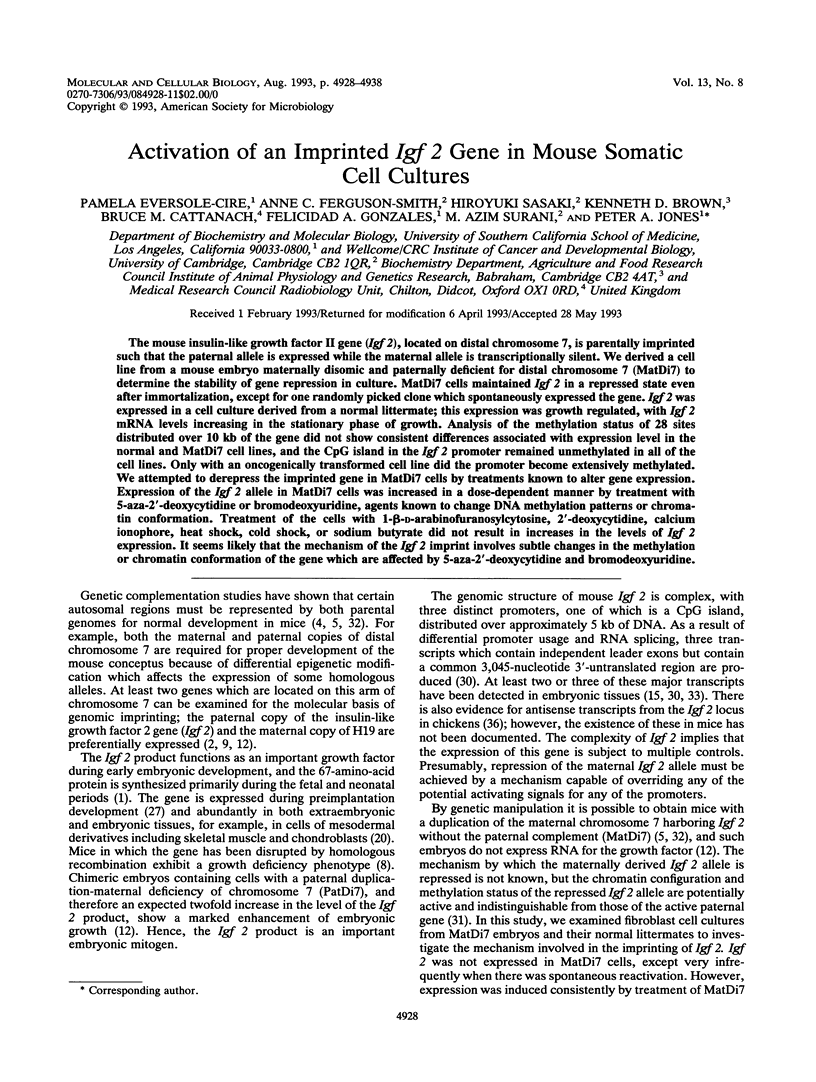
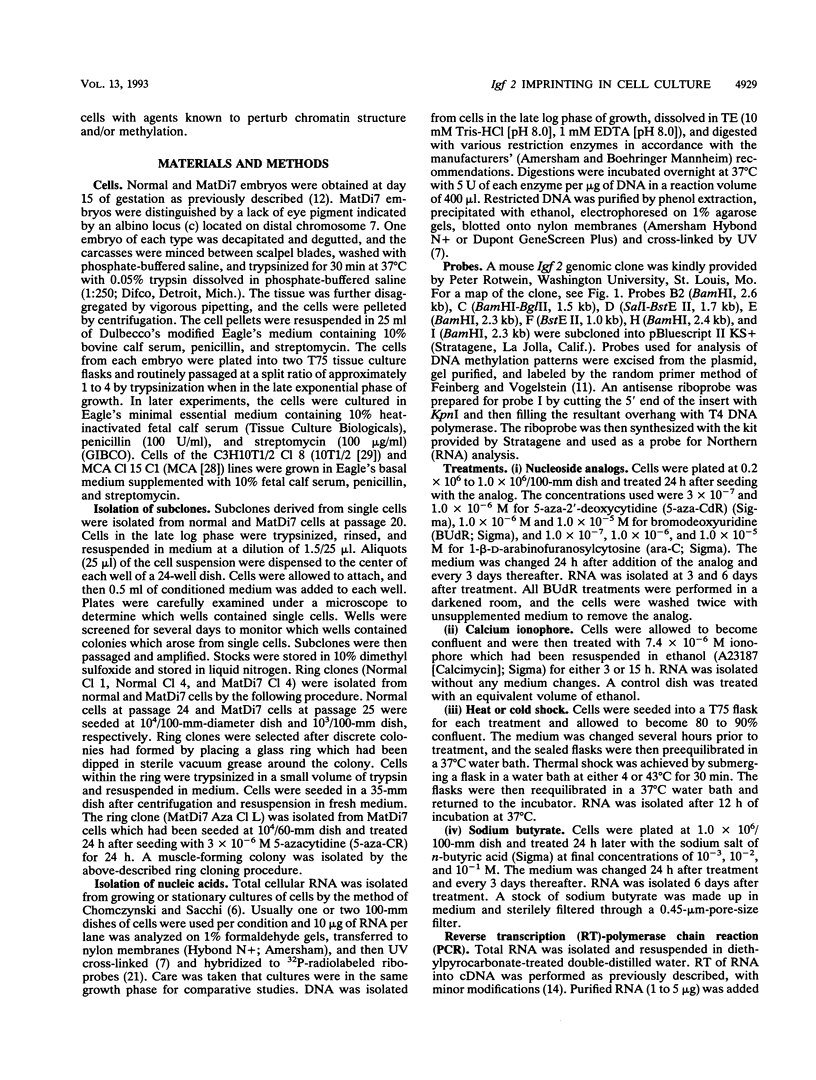
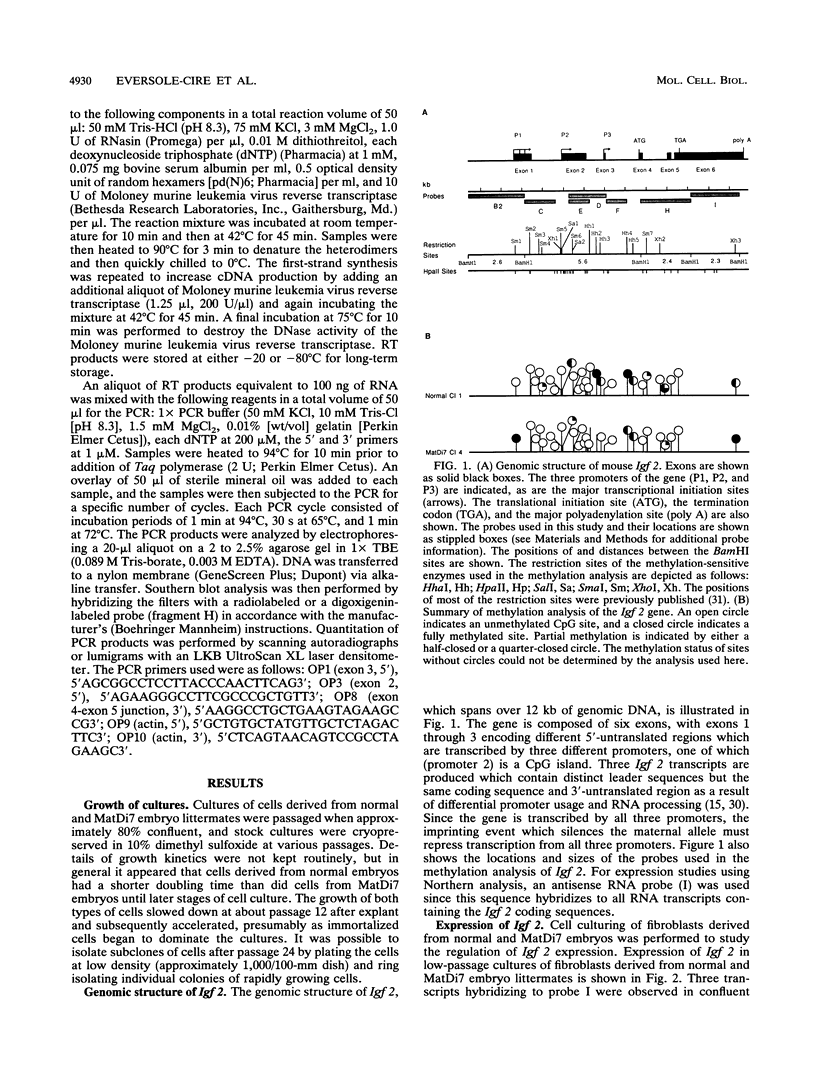
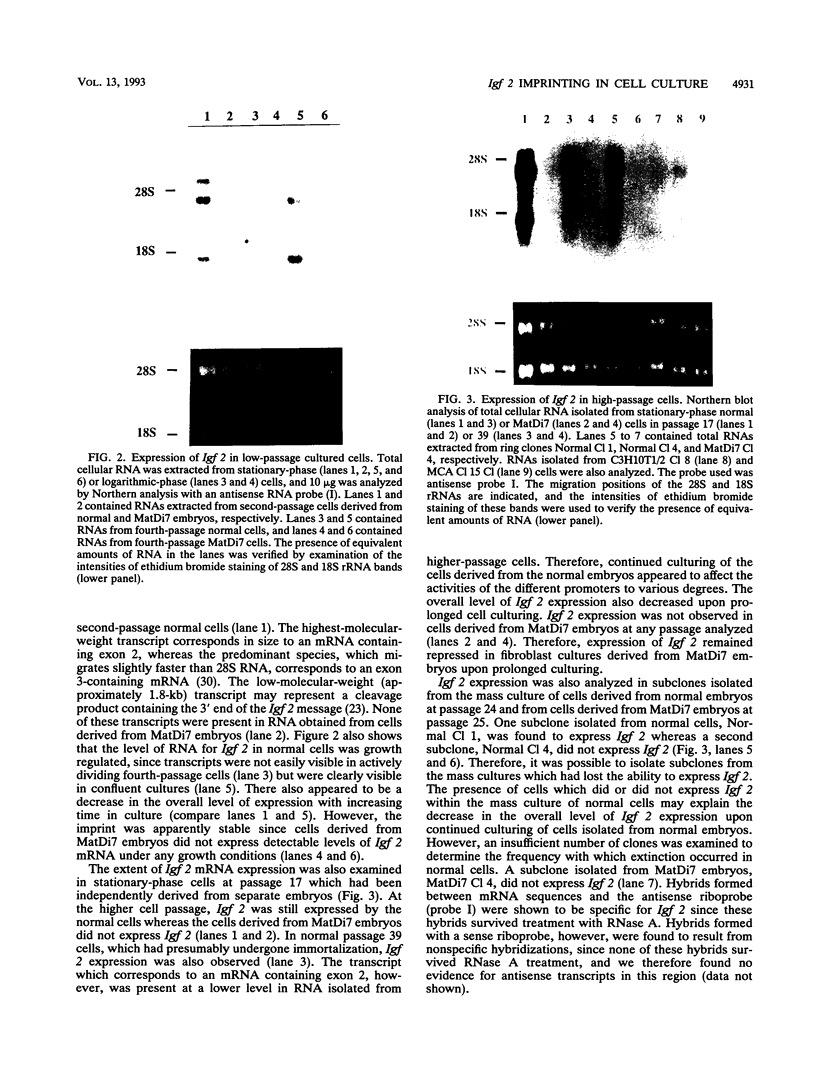
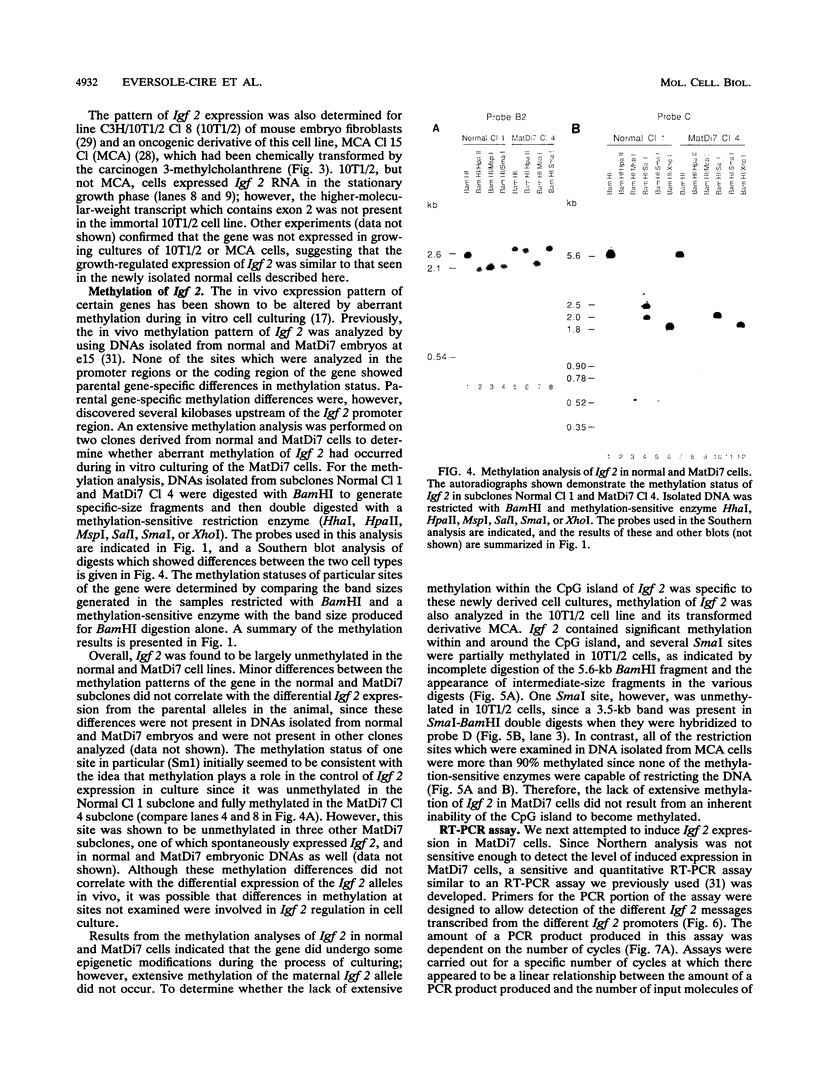
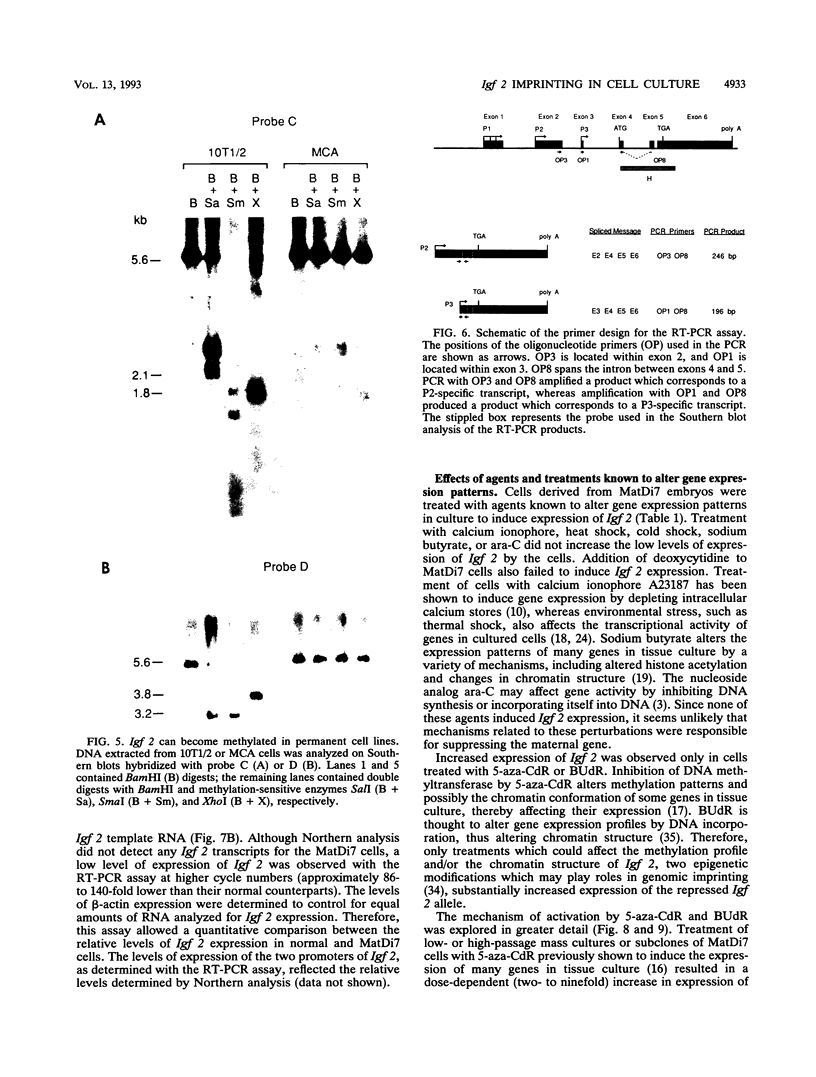
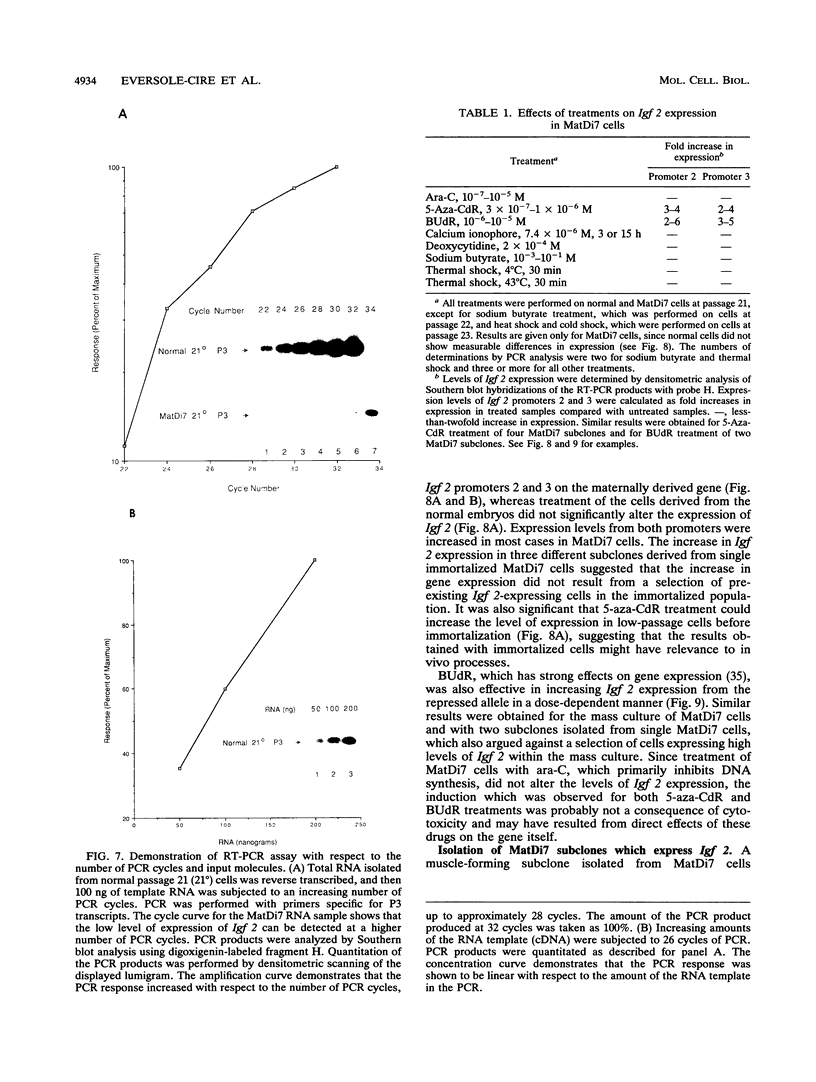
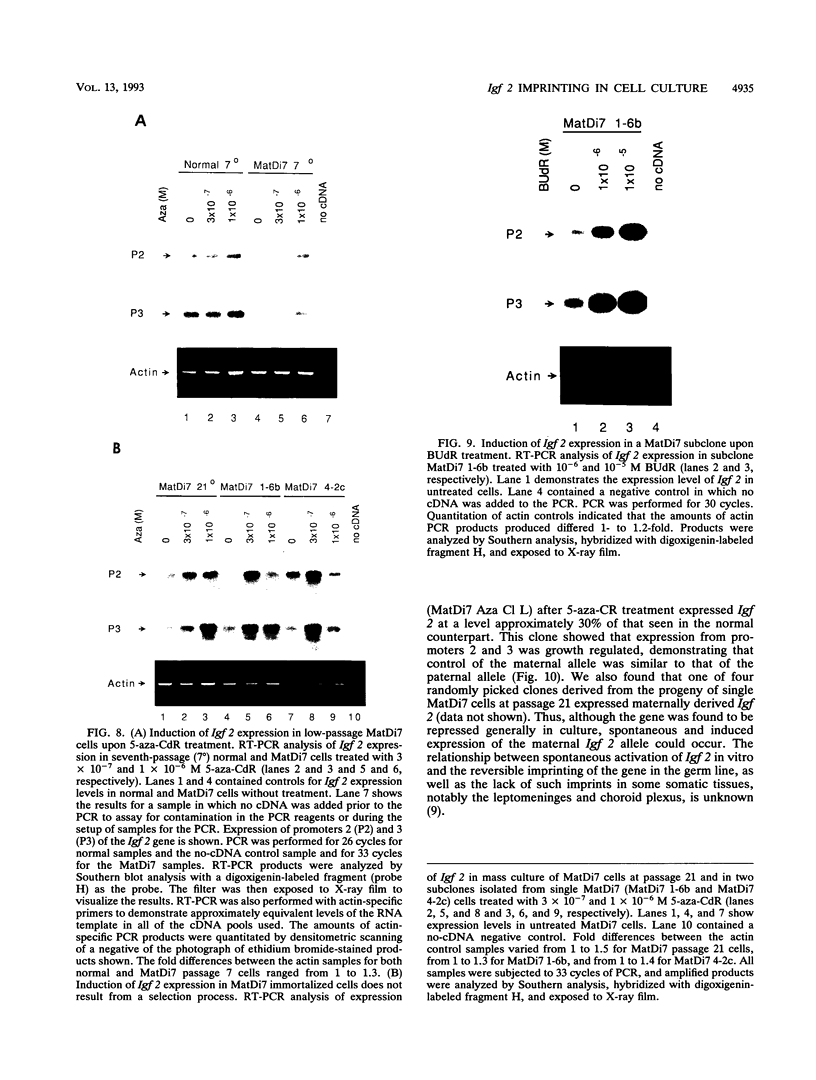

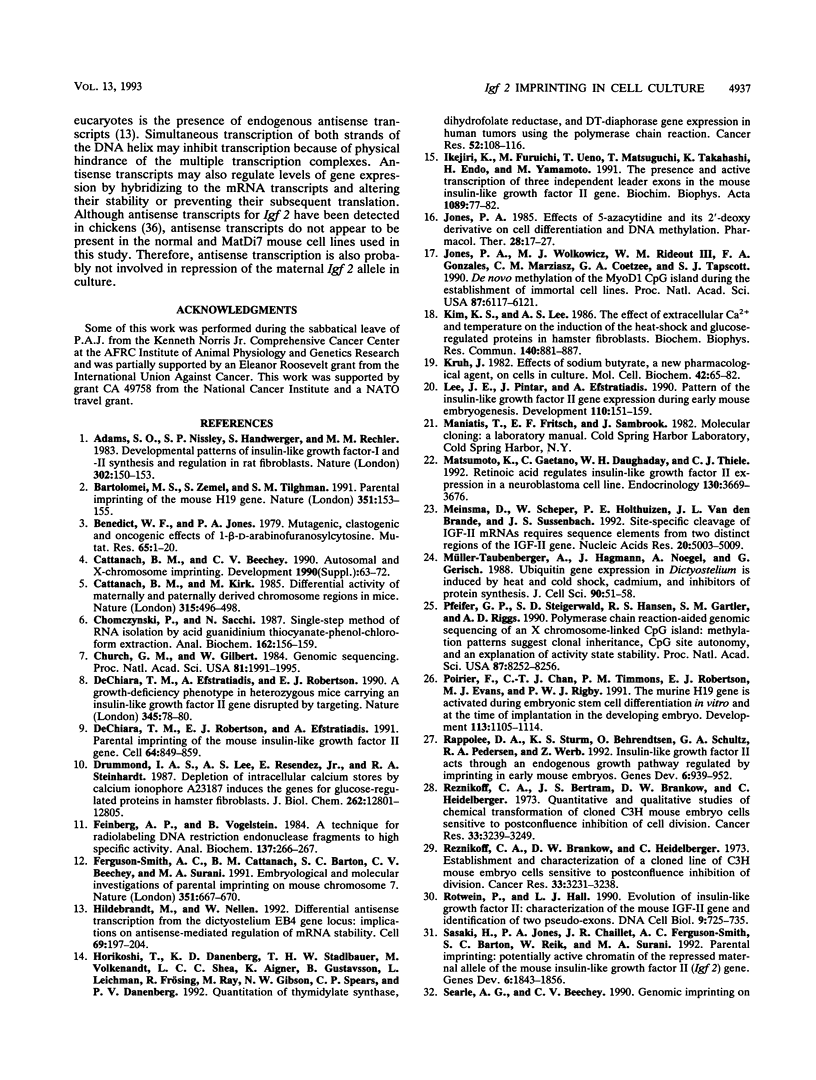
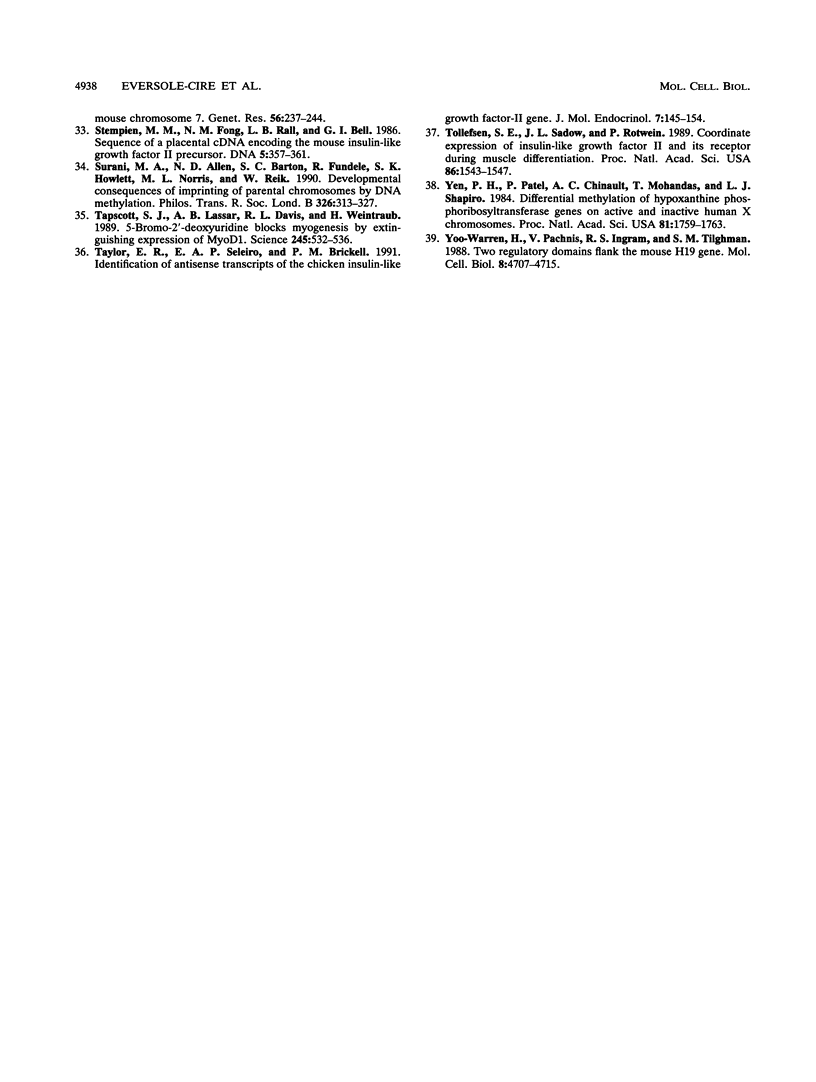
Images in this article
Selected References
These references are in PubMed. This may not be the complete list of references from this article.
- Adams S. O., Nissley S. P., Handwerger S., Rechler M. M. Developmental patterns of insulin-like growth factor-I and -II synthesis and regulation in rat fibroblasts. Nature. 1983 Mar 10;302(5904):150–153. doi: 10.1038/302150a0. [DOI] [PubMed] [Google Scholar]
- Bartolomei M. S., Zemel S., Tilghman S. M. Parental imprinting of the mouse H19 gene. Nature. 1991 May 9;351(6322):153–155. doi: 10.1038/351153a0. [DOI] [PubMed] [Google Scholar]
- Benedict W. F., Jones P. A. Mutagenic clastogenic and oncogenic effects of 1-beta-D-arabinofuranosylcytosine. Mutat Res. 1979 Mar;65(1):1–20. doi: 10.1016/0165-1110(79)90011-3. [DOI] [PubMed] [Google Scholar]
- Cattanach B. M., Beechey C. V. Autosomal and X-chromosome imprinting. Dev Suppl. 1990:63–72. [PubMed] [Google Scholar]
- Cattanach B. M., Kirk M. Differential activity of maternally and paternally derived chromosome regions in mice. Nature. 1985 Jun 6;315(6019):496–498. doi: 10.1038/315496a0. [DOI] [PubMed] [Google Scholar]
- Chomczynski P., Sacchi N. Single-step method of RNA isolation by acid guanidinium thiocyanate-phenol-chloroform extraction. Anal Biochem. 1987 Apr;162(1):156–159. doi: 10.1006/abio.1987.9999. [DOI] [PubMed] [Google Scholar]
- Church G. M., Gilbert W. Genomic sequencing. Proc Natl Acad Sci U S A. 1984 Apr;81(7):1991–1995. doi: 10.1073/pnas.81.7.1991. [DOI] [PMC free article] [PubMed] [Google Scholar]
- DeChiara T. M., Efstratiadis A., Robertson E. J. A growth-deficiency phenotype in heterozygous mice carrying an insulin-like growth factor II gene disrupted by targeting. Nature. 1990 May 3;345(6270):78–80. doi: 10.1038/345078a0. [DOI] [PubMed] [Google Scholar]
- DeChiara T. M., Robertson E. J., Efstratiadis A. Parental imprinting of the mouse insulin-like growth factor II gene. Cell. 1991 Feb 22;64(4):849–859. doi: 10.1016/0092-8674(91)90513-x. [DOI] [PubMed] [Google Scholar]
- Drummond I. A., Lee A. S., Resendez E., Jr, Steinhardt R. A. Depletion of intracellular calcium stores by calcium ionophore A23187 induces the genes for glucose-regulated proteins in hamster fibroblasts. J Biol Chem. 1987 Sep 15;262(26):12801–12805. [PubMed] [Google Scholar]
- Feinberg A. P., Vogelstein B. "A technique for radiolabeling DNA restriction endonuclease fragments to high specific activity". Addendum. Anal Biochem. 1984 Feb;137(1):266–267. doi: 10.1016/0003-2697(84)90381-6. [DOI] [PubMed] [Google Scholar]
- Ferguson-Smith A. C., Cattanach B. M., Barton S. C., Beechey C. V., Surani M. A. Embryological and molecular investigations of parental imprinting on mouse chromosome 7. Nature. 1991 Jun 20;351(6328):667–670. doi: 10.1038/351667a0. [DOI] [PubMed] [Google Scholar]
- Hildebrandt M., Nellen W. Differential antisense transcription from the Dictyostelium EB4 gene locus: implications on antisense-mediated regulation of mRNA stability. Cell. 1992 Apr 3;69(1):197–204. doi: 10.1016/0092-8674(92)90130-5. [DOI] [PubMed] [Google Scholar]
- Horikoshi T., Danenberg K. D., Stadlbauer T. H., Volkenandt M., Shea L. C., Aigner K., Gustavsson B., Leichman L., Frösing R., Ray M. Quantitation of thymidylate synthase, dihydrofolate reductase, and DT-diaphorase gene expression in human tumors using the polymerase chain reaction. Cancer Res. 1992 Jan 1;52(1):108–116. [PubMed] [Google Scholar]
- Ikejiri K., Furuichi M., Ueno T., Matsuguchi T., Takahashi K., Endo H., Yamamoto M. The presence and active transcription of three independent leader exons in the mouse insulin-like growth factor II gene. Biochim Biophys Acta. 1991 May 2;1089(1):77–82. doi: 10.1016/0167-4781(91)90087-3. [DOI] [PubMed] [Google Scholar]
- Jones P. A. Effects of 5-azacytidine and its 2'-deoxyderivative on cell differentiation and DNA methylation. Pharmacol Ther. 1985;28(1):17–27. doi: 10.1016/0163-7258(85)90080-4. [DOI] [PubMed] [Google Scholar]
- Jones P. A., Wolkowicz M. J., Rideout W. M., 3rd, Gonzales F. A., Marziasz C. M., Coetzee G. A., Tapscott S. J. De novo methylation of the MyoD1 CpG island during the establishment of immortal cell lines. Proc Natl Acad Sci U S A. 1990 Aug;87(16):6117–6121. doi: 10.1073/pnas.87.16.6117. [DOI] [PMC free article] [PubMed] [Google Scholar]
- Kim K. S., Lee A. S. The effect of extracellular Ca2+ and temperature on the induction of the heat-shock and glucose-regulated proteins in hamster fibroblasts. Biochem Biophys Res Commun. 1986 Nov 14;140(3):881–887. doi: 10.1016/0006-291x(86)90717-5. [DOI] [PubMed] [Google Scholar]
- Kruh J. Effects of sodium butyrate, a new pharmacological agent, on cells in culture. Mol Cell Biochem. 1982 Feb 5;42(2):65–82. doi: 10.1007/BF00222695. [DOI] [PubMed] [Google Scholar]
- Lee J. E., Pintar J., Efstratiadis A. Pattern of the insulin-like growth factor II gene expression during early mouse embryogenesis. Development. 1990 Sep;110(1):151–159. doi: 10.1242/dev.110.1.151. [DOI] [PubMed] [Google Scholar]
- Matsumoto K., Gaetano C., Daughaday W. H., Thiele C. J. Retinoic acid regulates insulin-like growth factor II expression in a neuroblastoma cell line. Endocrinology. 1992 Jun;130(6):3669–3676. doi: 10.1210/endo.130.6.1375906. [DOI] [PubMed] [Google Scholar]
- Meinsma D., Scheper W., Holthuizen P. E., Van den Brande J. L., Sussenbach J. S. Site-specific cleavage of IGF-II mRNAs requires sequence elements from two distinct regions of the IGF-II gene. Nucleic Acids Res. 1992 Oct 11;20(19):5003–5009. doi: 10.1093/nar/20.19.5003. [DOI] [PMC free article] [PubMed] [Google Scholar]
- Müller-Taubenberger A., Hagmann J., Noegel A., Gerisch G. Ubiquitin gene expression in Dictyostelium is induced by heat and cold shock, cadmium, and inhibitors of protein synthesis. J Cell Sci. 1988 May;90(Pt 1):51–58. doi: 10.1242/jcs.90.1.51. [DOI] [PubMed] [Google Scholar]
- Pfeifer G. P., Steigerwald S. D., Hansen R. S., Gartler S. M., Riggs A. D. Polymerase chain reaction-aided genomic sequencing of an X chromosome-linked CpG island: methylation patterns suggest clonal inheritance, CpG site autonomy, and an explanation of activity state stability. Proc Natl Acad Sci U S A. 1990 Nov;87(21):8252–8256. doi: 10.1073/pnas.87.21.8252. [DOI] [PMC free article] [PubMed] [Google Scholar]
- Poirier F., Chan C. T., Timmons P. M., Robertson E. J., Evans M. J., Rigby P. W. The murine H19 gene is activated during embryonic stem cell differentiation in vitro and at the time of implantation in the developing embryo. Development. 1991 Dec;113(4):1105–1114. doi: 10.1242/dev.113.4.1105. [DOI] [PubMed] [Google Scholar]
- Rappolee D. A., Sturm K. S., Behrendtsen O., Schultz G. A., Pedersen R. A., Werb Z. Insulin-like growth factor II acts through an endogenous growth pathway regulated by imprinting in early mouse embryos. Genes Dev. 1992 Jun;6(6):939–952. doi: 10.1101/gad.6.6.939. [DOI] [PubMed] [Google Scholar]
- Reznikoff C. A., Bertram J. S., Brankow D. W., Heidelberger C. Quantitative and qualitative studies of chemical transformation of cloned C3H mouse embryo cells sensitive to postconfluence inhibition of cell division. Cancer Res. 1973 Dec;33(12):3239–3249. [PubMed] [Google Scholar]
- Reznikoff C. A., Brankow D. W., Heidelberger C. Establishment and characterization of a cloned line of C3H mouse embryo cells sensitive to postconfluence inhibition of division. Cancer Res. 1973 Dec;33(12):3231–3238. [PubMed] [Google Scholar]
- Rotwein P., Hall L. J. Evolution of insulin-like growth factor II: characterization of the mouse IGF-II gene and identification of two pseudo-exons. DNA Cell Biol. 1990 Dec;9(10):725–735. doi: 10.1089/dna.1990.9.725. [DOI] [PubMed] [Google Scholar]
- Sasaki H., Jones P. A., Chaillet J. R., Ferguson-Smith A. C., Barton S. C., Reik W., Surani M. A. Parental imprinting: potentially active chromatin of the repressed maternal allele of the mouse insulin-like growth factor II (Igf2) gene. Genes Dev. 1992 Oct;6(10):1843–1856. doi: 10.1101/gad.6.10.1843. [DOI] [PubMed] [Google Scholar]
- Stempien M. M., Fong N. M., Rall L. B., Bell G. I. Sequence of a placental cDNA encoding the mouse insulin-like growth factor II precursor. DNA. 1986 Oct;5(5):357–361. doi: 10.1089/dna.1986.5.357. [DOI] [PubMed] [Google Scholar]
- Surani M. A., Allen N. D., Barton S. C., Fundele R., Howlett S. K., Norris M. L., Reik W. Developmental consequences of imprinting of parental chromosomes by DNA methylation. Philos Trans R Soc Lond B Biol Sci. 1990 Jan 30;326(1235):313–327. doi: 10.1098/rstb.1990.0014. [DOI] [PubMed] [Google Scholar]
- Tapscott S. J., Lassar A. B., Davis R. L., Weintraub H. 5-bromo-2'-deoxyuridine blocks myogenesis by extinguishing expression of MyoD1. Science. 1989 Aug 4;245(4917):532–536. doi: 10.1126/science.2547249. [DOI] [PubMed] [Google Scholar]
- Taylor E. R., Seleiro E. A., Brickell P. M. Identification of antisense transcripts of the chicken insulin-like growth factor-II gene. J Mol Endocrinol. 1991 Oct;7(2):145–154. doi: 10.1677/jme.0.0070145. [DOI] [PubMed] [Google Scholar]
- Tollefsen S. E., Sadow J. L., Rotwein P. Coordinate expression of insulin-like growth factor II and its receptor during muscle differentiation. Proc Natl Acad Sci U S A. 1989 Mar;86(5):1543–1547. doi: 10.1073/pnas.86.5.1543. [DOI] [PMC free article] [PubMed] [Google Scholar]
- Yen P. H., Patel P., Chinault A. C., Mohandas T., Shapiro L. J. Differential methylation of hypoxanthine phosphoribosyltransferase genes on active and inactive human X chromosomes. Proc Natl Acad Sci U S A. 1984 Mar;81(6):1759–1763. doi: 10.1073/pnas.81.6.1759. [DOI] [PMC free article] [PubMed] [Google Scholar]
- Yoo-Warren H., Pachnis V., Ingram R. S., Tilghman S. M. Two regulatory domains flank the mouse H19 gene. Mol Cell Biol. 1988 Nov;8(11):4707–4715. doi: 10.1128/mcb.8.11.4707. [DOI] [PMC free article] [PubMed] [Google Scholar]



